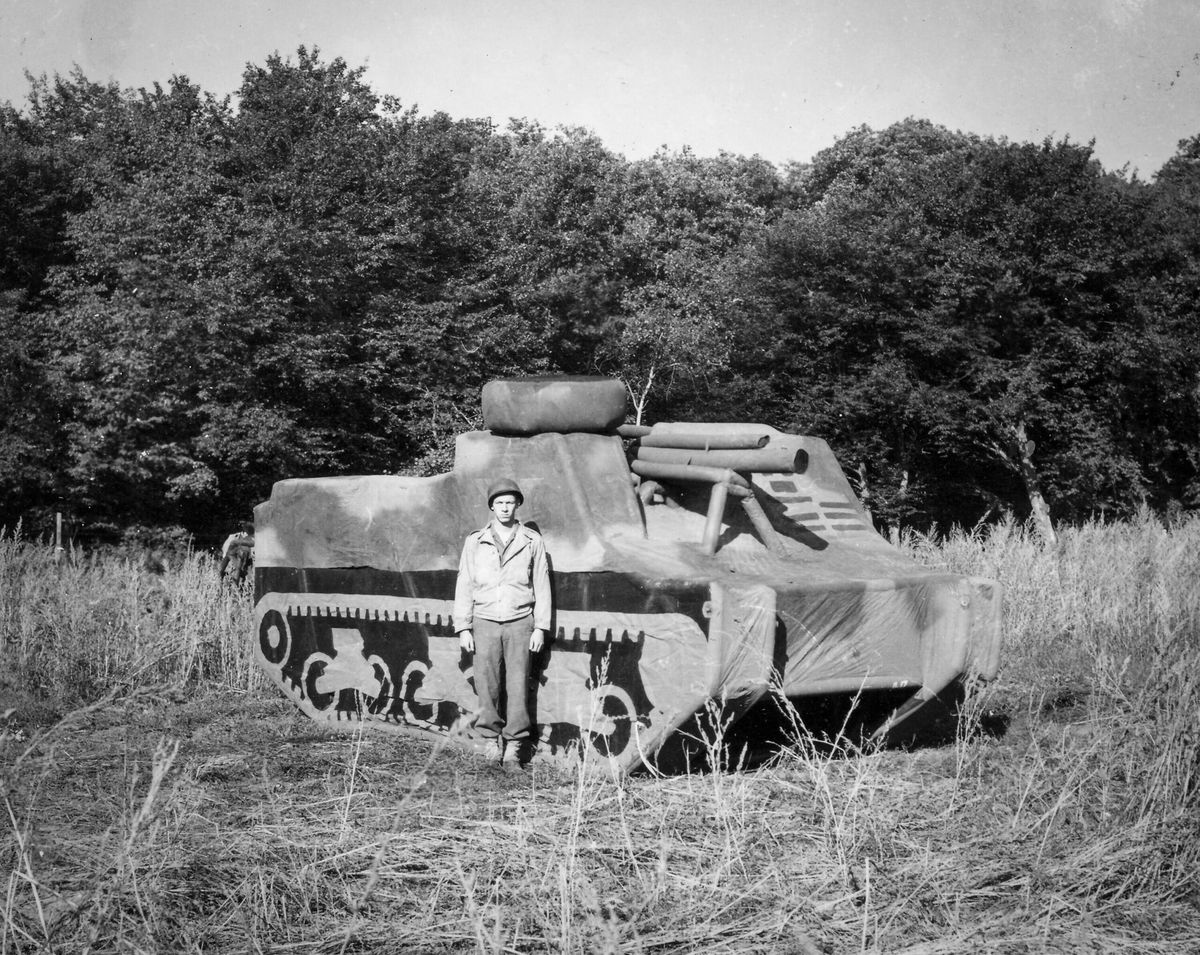Biden signs bill awarding Congressional Gold Medal to WWII’s ‘Ghost Army’

An unknown "Ghost Army" soldier of the 23rd Headquarters Special Troops is pictured before an inflatable M7 Priest self-propelled gun on September 14
By Veronica Stracqualursi, CNN
President Joe Biden on Tuesday signed a bill into law that awards the Congressional Gold Medal to a top-secret US Army unit that used deceptive tactics like inflatable tanks, fake radio transmissions and sound effects to fool enemy forces during World War II.
Known as the “Ghost Army,” the US Army’s 23rd Headquarters Special Troops and the 3133rd Signal Service Company employed tactics like using inflatable equipment, including artillery and airplanes, and creating “phony headquarters staffed by fake generals” to trick the Nazis about “sizable American forces where there were none and to draw the enemy away from Allied troops,” the legislation said.
Many of the Ghost Army soldiers were recruited creatives — engineers, architects and art students who’d go on to be famous, including fashion designer Bill Blass, painter Ellsworth Kelly and photographer Art Kane, according to the National World War II Museum.
The 23rd consisted of roughly 1,100 men, but they were capable of duping the enemy into thinking they were a force of 30,000, according to the museum. To impersonate another larger US Army unit, they did things like sew fake patches onto their uniforms and paint false markings on their vehicles, according to the bill.
They carried out more than 20 deception missions, often near front lines, in Europe toward the end of the Second World War, according to the Ghost Army Legacy Project, which has been preserving the legacy of the unit and advocated for the Congressional Gold Medal — Congress’ “highest expression of national appreciation” — to be awarded to the veterans.
During the Battle of the Bulge, the 23rd used counterfeit radio traffic to deceive German forces about efforts by Gen. George S. Patton’s Third Army to relieve Allied troops defending the town of Bastogne, Belgium.
And in Italy in April 1945, the 3133rd Signal Service Company used “sonic deception” to misrepresent where Allied troops were located on the German defense line, which involved blasting prerecorded sounds to mimic Army units’ movements at night.
In its final mission, “Operation Viersen,” in March 1945, the 23rd devised a plan that sought to pull Germans away from the US Ninth Army, which was attempting to cross the Rhine River into Germany. The 23rd pretended to be two full divisions of US forces using “fabricated radio networks, soundtracks of construction work and artillery fire, and hundreds of inflatable and real vehicles,” the legislation said.
A long-kept secret
Long after the war ended, the Ghost Army and its heroism in World War II were kept secret. In 1996, a history of the unit documented by a former member was declassified, according to the Ghost Army Legacy Project.
The Senate passed the bipartisan legislation awarding the troops the Congressional Gold Medal by unanimous consent in December and the House passed the bill by a voice vote last month.
“With President Biden’s signature today, the flesh and blood and brains and courage of the brave men of this unit are finally getting the public recognition they deserve,” Democratic Sen. Ed Markey of Massachusetts, the bill’s main sponsor, said in a statement Tuesday.
Rep. Annie Kuster, who’s introduced the bill in every Congress since 2015, said that “more than 75 years after defeating fascism in Europe, it’s time these soldiers receive the highest honor we can award: the Congressional Gold Medal.”
“Through their courageous, creative, and innovative tactics, the top-secret Ghost Army outmaneuvered and deceived the Nazis, saving thousands of Allied lives during World War II,” the New Hampshire Democrat added.
The Ghost Army’s deception operations saved up to an estimated 30,000 Allied soldiers’ lives, Kuster’s office said in a news release, citing a US Army analysis after WWII.
Ghost Army veteran Bernie Bluestein, 98, called it “an honor” to be awarded the medal.
“I never in my lifetime expected anything like this, it completely blasts me. I’m just sorry that there are not more of my fellow soldiers still alive that can be enjoying this as much as I do,” he said in a statement provided by the Ghost Army Legacy Project.
Rick Beyer, the president of the Ghost Army Legacy Project, who also produced a documentary and co-authored a book about the unit, reflected on the honor, saying in a statement: “Armed with their wits and guile these men saved lives and helped win the war.”
According to the project, there are nine surviving veterans of the Ghost Army, including Bluestein: Bill Anderson, 97, of Kent, Ohio; John Christman, 97, of Leesburg, New Jersey; George Dramis, 97, of Raleigh, North Carolina; Manny Frockt, 97, of West Palm Beach, Florida; Nick Leo, 99, of Brentwood, New York; Mark Mallardi, 98, of Edgewater, Florida; Bill Nall, 97, of Dunellon, Florida; and Seymour Nussenbaum, 98, of Monroe Township, New Jersey.
The-CNN-Wire
™ & © 2022 Cable News Network, Inc., a WarnerMedia Company. All rights reserved.